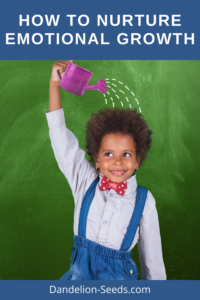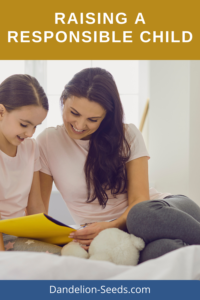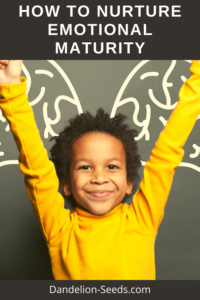
Sign in
Don't have an account with us? Sign up using the form below and get some free bonuses!

In the excerpt below from Peaceful Discipline: Story Teaching, Brain Science, and Better Behavior, I discuss how we can nurture our children's social-emotional intelligence and emotional maturity.
Perhaps the most important take-away, though (spoiler alert!), is that emotionally mature people model emotional maturity, rather than expect children to magically pick it up out of nowhere.
Below are four ways we can model emotional maturity in ways that are not only accessible and achievable for us, but that also help our children grow in this area. Emotional maturity is a learned skill.

"Emotional maturity is about your ability to understand and manage your emotions. An emotionally mature person has reached (and continues to work at reaching) a level of self-understanding with regards to their thoughts and behaviors and then decides how to best approach and cope with situations that might otherwise be trying or challenging. Being emotionally mature can help you reach successful resolutions to problems, as well as keep problems from overwhelming you.
It’s important to understand that emotional maturity is always an active work in progress. It’s not a situation where a certain level of self-understanding is reached once and then remains static in all situations moving forward. But a keen awareness of what you can bring to the table emotionally to cope with any situation that comes your way. And, it’s also important to know that not everyone will always be able to successfully act with emotional maturity in every situation. Not everyone is able to keep their cool each and every time when responding to tough situations." (source)
In this excerpt from Peaceful Discipline, I cover how we can model emotional maturity for our children, knowing full well that emotional immaturity is the norm for childhood.
Kids are kids, and they're not "wrong" for their less mature behavior--they're simply new here. We can't (and shouldn't try to) rush a child to mature, but we can help them learn to express themselves in optimal ways.
After all, children don't have the past experiences that we do, and therefore, lack practice exhibiting emotional maturity. Life will give them opportunities for this, of course, but it's the full responsibility of the adult to model emotional maturity if we want our children to pick up on it and embrace it.
We can allow—and better, create—many opportunities for joy.
The more joy and emotional peace are our “defaults” with our kids, the more they’ll become our children’s defaults, too.
If, for example, we choose to take life (and ourselves) a little less seriously, our kids will mimic that as they grow older. They’ll learn not to sweat the little things that go wrong, and rather, they’ll seek out experiences that contribute to their overall sense of well-being. Even better, when that’s their default, they’ll pass that gift along to others. Happiness is contagious in beautiful ways.
We can infuse play into the mundane. We can laugh and dance and sing together. We can model a glass-half-full attitude, even when life is imperfect and messy.

An example:
One night, I was exceptionally tired and didn’t feel like cooking, but I somehow mustered up the barely-there energy to throw a decent meal into the oven. Once it was cooked, I went to retrieve it, looking forward to little more than going to sleep.
As I pulled it out of the oven, however, I dropped it, and it landed upside down on the floor. It was a colossal hot mess, and I was tempted to follow suit. My daughter rushed over and was clearly waiting to see how I’d respond.
Keeping myself in check, I spoke to the floor: “Oh, floor! If you were hungry, you could’ve just asked me for dinner! You didn’t need to go and steal my food. Oh dear.”
My child cracked up. There was nothing I could do about my mistake—I don’t think a three-second rule applies to a 350-degree pile of food that’s splattered across the hard- woods. So, we dealt with it.
Not only did we not keel over from having cereal for din- ner that one night (far from it), but my child also likely learned that we get to choose how we want to respond to unfortunate situations. This was a prime opportunity to model the “no big deal” attitude I want her to embrace and keep for when she inevitably ruins something of her own someday.
Do I always handle it so gracefully? Heck no! Sometimes I crumble and grumble, just like everybody else. And that’s okay, too. What matters most is that my child will have more than one option of how to react in her mind when she’s there herself.
We can allow and encourage cathartic tears when the child is sad, which creates nonjudgmental space for their feelings.
We can refrain from offering quick solutions or distractions:
We can replace “Don’t cry” with “I’m here for you. Let it out.”
We can do the work to release our own discomfort around our child’s tears, knowing that by allowing those tears to flow freely, the child is washing away their hurts.
We can honor the child’s experience. While we might be tempted to find humor in a child’s sadness that their favorite blade of grass was mown down, we can trust that their feelings are as real to them as ours are to us. (I once held a funeral for my child’s beloved roly-poly [potato bug] that she’d discovered in our garden. She mourned and woke up crying for two nights after its passing. It was a very real loss for her.)

We can model healthy anger management strategies, including journaling, exercising, and using “I” statements rather than blaming or shaming “you” statements during conflict.
We can practice pausing before reacting to situations that anger us. We can verbalize to our children why we’re doing these things.
We can replace “You did WHAT? You’re making me crazy!” with “I’m feeling frustrated. I’m going to take some deep breaths until I feel more peaceful again.”
We can stop thinking of the child as having disobeyed when they’ve done something we don’t like. If we think in terms of disobedience, our tendency is to want the opposite—to make them “obey.” If we reword and reframe “disobeyed” to the child feeling “dysregulated,” we can remember that the opposite is “regulated”—and that the solution is to help them find their calm. I’ll share more about this in a second.

We can encourage our children to seek support when they need it, understanding that co-regulation, rather than self-regulation, is what ultimately supports the child’s ability to cope well during stress or difficulty.
Co-regulation is when we stay present physically and emotionally alongside our child to help them process their feelings, rather than send them away for so-called self-soothing.
The way children learn to self-soothe is by practicing calming strategies alongside their trusted adults. There’s no age by which children must be able to consistently accomplish this on their own.
Even adults often seek out other adults for support when they’re feeling particularly upset or bothered by something. Be- cause children learn through repeated practice with an adult, in time, they’ll begin to emulate what they’ve learned from us. They’ll begin to find their own peace without always needing us for support.
Again, of course, like all things in child development, this process isn’t linear—it’s developmentally healthy and normal to need connection and support from others throughout our lives. No one thrives in an emotional vacuum.

If you've been following my page for a little while, you've likely noticed that almost everything I recommend is parent-centric rather than focused on changing children's behavior.
The vast majority of the time, when we show up for ourselves and do the inner work we need to do, our kids' behavior automatically improves alongside our own.
We know that:
Our own emotional regulation is what helps our children find their peace faster; a dysregulated adult cannot possibly regulate a struggling child.
Emotional maturity is a skill that takes practice and intentional effort. Even those of us who've been doing the work of conscious parenting for a long time can still have unexpected and/or unpleasant emotional reactions (and, with self-compassion, we get to repair when that happens).
We need to set healthy boundaries. Setting healthy boundaries is a life skill that helps our children grow in their own emotional maturity. Part of this means that our children get to practice setting boundaries with us, too, and we need to respect them unless there's a very compelling reason to do anything to the contrary.
Kids are going to look for our signs of emotional maturity and gauge whether we're "adulting" in ways that they want to embody as they grow older.
When we're emotionally mature, we likely:
Have a fairly fulfilling life, even when things aren't "perfect" -- because we're not always chasing after some elusive and intangible dream of perfection. Anxiety decreases when we lovingly stop looking for a perfect world, and accept the truth that all is as it should be.
Exhibit emotional regulation even in the midst of adversity. We do get to feel all our feelings and express them in emotionally mature ways. For example, when we feel angry or upset, we get to say so, but we do it using non-violent communication strategies. We no longer blame or try to control others. Instead, we use words that are valid yet do no harm to the other person.
Keep an open mind, knowing that relationships are a dynamic, and admit our own emotional immaturity when we accidentally exhibit it.
Commit to self-improvement and personal growth. We're self-aware enough to know that we don't know everything, and that it's okay to be wrong.
Communicate our needs in ways that are authentic, while still being sensitive to the relationship and the other person's perspective.
Avoid taking on other people's emotions but focus on taking responsibility for our own.
Express gratitude even in challenging situations because we know that all life experiences--including the tough situations in life--are opportunities to learn.
In addition to these common signs of emotional maturity, we're willing to take responsibility for our mistakes and model a certain level of humility.
We commit to our ongoing emotional development in our adult life because we're always striving to be our best selves (with a whole lot of grace for being human along the way).
Perhaps the biggest telltale sign that we're emotionally mature, and modeling emotional maturity for our children, is that we value relationships over outcomes.
Will our children feel that we had to be "right" in every argument, or will they see that we're actively working to understand their perspective?
Will our children believe deep in their souls that all of their feelings are safe with us, and that they won't be sent away to handle difficult behaviors or emotions on their own?
When they're struggling with something our someone (even if it's us!), will they recognize that we value our relationship with them above all, and truly feel that we're prioritizing the greater good instead of adhering to our parenting agenda?
When we create the emotional safety our children need to thrive, they'll want to do well for us because we've modeled how to treat others with love, respect, and compassion. In turn, we'll feel better about our relationships with them, because we've worked to develop emotional safety between us.
When children feel emotionally safe, they grow in the emotional maturity we've modeled for them and can share it in their own world, present and future.
